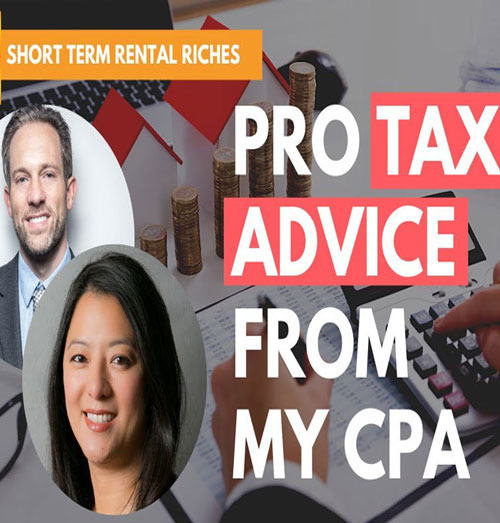9 Essential Steps for Purchasing an Existing Short-Term Rental Property
If you’re looking to buy an existing short-term rental, it’s essential to understand that it’s not as simple as transferring ownership. There are several critical steps involved in making sure the property you’re purchasing will continue to perform well.
This episode will walk you through the financial due diligence process, how to handle existing reservations and Airbnb reviews, and the potential challenges of dealing with third-party STR management. Whether you’re a seasoned real estate investor or just starting your Airbnb business, these tips will guide you through the complexities of buying a property that’s already operating as a short-term rental.
One of the most important aspects of this process is ensuring that the financials of the property are accurate. It’s not enough to rely on the seller’s numbers—you’ll need to verify the income with actual bank statements and use tools like AirDNA, PriceLabs, or STR Insights to get accurate estimates of the property’s revenue potential.
But beyond finances, there’s also the question of what’s included in the purchase. Are the photos, furniture, and even the Airbnb account being transferred? If not, you’ll need a plan for how to manage existing bookings and recreate the property’s online presence. We’ll dive into these details so you can avoid the pitfalls that come with buying an existing short-term rental.
Episode highlights:
-
Financial Due Diligence: Verify all income claims with actual bank deposits and use tools like AirDNA and PriceLabs for accurate revenue estimates.
-
What’s Included: Ensure the purchase agreement clearly specifies what’s included in the sale—furniture, photos, and the Airbnb account.
-
Airbnb Account Transfer: Learn about the challenges of transferring an existing Airbnb account and reviews, and what to do if the seller won’t transfer the account.
-
Managing Existing Reservations: Understand how to manage and honor existing reservations, or how to reschedule or cancel them if needed.
-
STR Management Tips: If the property is managed by a third party, know what to expect regarding the transfer of bookings and control of the property’s listings.
I hope this episode has provided some clarity on the process of buying an existing short-term rental. There’s a lot to consider, but if you take these steps, you’ll ensure a smooth transition and protect your investment. Whether you’re handling Airbnb reviews, existing reservations, or setting up new listings, the key is to stay organized and informed.
–
Need help managing your short-term rental and you don’t want to go it alone? Shoot us a message here and we’ll see if we can help.
Are you enjoying the podcast? Please subscribe, leave a rating and a review, and share it! This helps us reach others that may find the info helpful as well.
You can find all of our links here including our recommended resources, short-term rental playbook, Instagram, and more!
Click here to view the transcript
If you’re in the process of buying an existing short term rental, or you plan to in the near future, there are some things you need to know.
It’s not exactly a simple transition from one owner to the next.
So we’re going to break that down today in nine steps, nine things that you really need to know if you are buying an existing short term rental.
Welcome to Short Term Rental Riches.
We’ll discuss investing in real estate, but with a specific focus on short term rentals, quick, actionable items to acquire, manage, and scale your portfolio.
I’m your host, Tim Hubbard.
Well, welcome back to the show.
I’m happy you’re here again.
Today, we’re talking about something that’s near and dear to my heart and exciting, and that is acquiring more short-term rentals.
There’s some really important pieces that go into this, and we’re just gonna jump right in.
The first piece is our financial due diligence.
We’ve talked about this a lot on the show before, so if you’re new to the channel, thanks for joining.
You can check out all of our prior episodes at strriches.com.
We also have a handy little AI bot in the bottom right corner where you can ask it simple questions like, what are the due diligence steps for buying a property?
We actually have a checklist for you on there as well you can download.
But I want to break this down because we’ve been bringing on a lot of new partners.
It’s been really exciting.
And a lot of them coming on are acquiring a new short term rental.
We’ve even had partners sell a short term rental and go to a new partner.
And so there’s a lot of little challenges that you might not be thinking about that can pop up.
So again, the first piece, the first step to this is the financial due diligence.
We don’t want to buy a property where the numbers don’t make sense, right?
And so we want to get all the historic financial information from the prior owner.
We want to have that in a CSV file, an Excel file.
But we can’t really stop there.
Let’s say that owner says the property made $100,000 last year and they gave you an Excel file that shows $100,000.
Well, if we go back to my days in the apartment world, working as an investment broker, working with large apartment buildings, buying and selling, we didn’t just take the owner’s word for it.
As much as we’d like to trust everyone out there, we would take it a step further and we would ask for bank accounts showing those deposits going in there.
So if you’re buying a property that has a really high past historic value, I would take it a few steps further, ask for a few bank statements just to verify that.
The next thing you want to do is get your own current estimates.
Remember, you can use tools like airdna.co, you can use PriceLabs, you can use MashVisor.
But the reality is none of these tools are perfect.
And so the more you use, the better that estimate, the more accurate that estimate I should say is going to be.
These tools have a really big variation.
We use them constantly throughout the week, every week, and we see really big, scary differences between the valuations they give on properties.
So make sure that you’re getting your own estimates, or if you’re not comfortable doing that on your own, that you reach out to someone that can help you with that.
There’s a lot of industry help out there.
There’s one company called STR Insights, for example.
So the more information, the better you have.
The next thing that you’re going to need to verify is if the property is actually actively listed.
So if this owner is selling the property, they may have done what we call snoozing the listing, and that means that it disappears from the search results.
That also means you have no way to verify past reviews.
So if that’s the case, you want to make sure that you also get those reviews from the prior owner, and ideally in a screenshot format or a video format.
Now, we actually did an episode on how to analyze Airbnb competition in 30 seconds.
I know that sounds super crazy, but it’s reality using free AI.
That’s episode 244.
So if you’re buying a new property, I really recommend that you do that and you analyze the reviews and the performance of the property in just 30 seconds using that tool.
So that’s the third piece, really, the financial due diligence.
We know that reviews have a huge impact on the revenue and the amount of reviews have a huge impact.
And so we want to make sure that we’re checking all the boxes when it comes to our financial due diligence.
So let’s assume we’re comfortable with all the numbers.
We’re moving forward.
Step two is to determine exactly what’s included in the purchase.
So we know if we’re buying an existing short term rental, it’s going to have furniture in there.
But is all the furniture outlined in the purchase agreement?
Is the spa included or is the barbecue included or you name it?
The towels, the linens.
We want to make sure that all of the furniture is actually included.
because if the prior owner takes something out and the photos no longer match our property, when a guest shows up, well, they’re not going to be really, really happy.
And that leads me to the next piece is, are the photos actually included in the purchase?
So there’s quite a few different scenarios when we’re acquiring a new short term rental.
It may be that we’re acquiring a property that’s run by a property management company, in which many cases, they will not pass the photos on to you unless you continue to manage with them.
So we’re going to run through the advantages and disadvantages of acquiring a property that’s under a property manager versus one that’s an individual owner with their own Airbnb account versus one that will transfer that account to you versus one that won’t.
And that leads me to the final piece in what’s actually included in the purchase.
And this is a really big one.
And that is the OTA account or the Airbnb account or the accounts where that property is actually listed.
Remember, if you have to start over from zero, a property that has zero reviews is not going to perform as well as a property that has 50 excellent reviews.
That’s just the reality.
Now, you may be thinking, why would the owner not want to just transfer me their account if I’m willing to pay more for the property because it has great reviews and it has a whole bunch of them?
Well, there’s several reasons for that.
And the reality is, it’s actually pretty uncommon that they’re going to transfer the account.
So we’ll dive into that in one quick second.
Before we do, I want to talk about the most ideal situation.
And that is if they actually do transfer that account to you.
This is step three.
There’s only really a few things that you need to do here.
So the first piece is you want to make sure that you have full access to the account.
You want to make sure that the banking information is changed from the prior owner to your account.
Of course, you want to have all the existing reservations outlined in your purchase agreement and ideally held in an escrow account so that once the property actually closes, you have 100% right to those existing reservations.
And you have a legal contract saying that even if they went to the wrong account, the prior owner’s account, for example, that you need to be reimbursed for those.
Remember, the larger the property, the more luxurious the property, the more often there’s going to be reservations way far out in the future.
And depending on what channels this property was listed on, a lot of those reservation payments might already be taken and you’re going to need access to those.
Okay, so pretty easy if the owner’s transferring the account over, we just want to make sure that all the escrow and all the existing reservations are accounted for, that we have the right bank info in there.
One last thing that might come up is that the prior owner might need a tax document from you at the end of the year.
Let’s say they operated the property for half the year and they made $60,000.
Well, Airbnb and the different channels are very likely going to issue him a 1099, which only you would have access to if you actually took over his own account.
So it’s pretty easy things to do.
You just print off the PDF and send to him, but you want to make sure that that’s talked about beforehand.
Okay, so that’s the ideal situation.
We buy an amazing property with amazing reviews and a lot of them, and we get full access to that account and all those future reservations.
Now, this is when it starts to get challenging.
Let’s jump into step number four, a situation where the owner isn’t transferring their accounts over to you.
And I know it sounds like common sense, like this is the thing they would do because they can very likely sell their property for more with these reviews.
But a lot of times, owners have multiple properties under the same Airbnb account.
And unfortunately, there is no way to transfer one property at the time of this recording anyways.
There’s no way to transfer one property from an Airbnb account to another Airbnb account.
Some owners might also be a little scared to share an account that has banking information on there as well.
So there’s quite a few reasons really why you might just have to start over from scratch.
And that leads me to step number five.
We’re starting over from scratch.
Either that prior Airbnb account owner couldn’t transfer their account, we also can’t transfer the reviews either.
So that unfortunately is not an option.
So if we’re starting over and this property had existing reservations under the prior owner, we’re gonna have to try to accommodate those guests as best as possible so we don’t lose that income, but it gets a little sticky.
So the first option would be for the prior owner to just cancel the reservations.
Again, they’re not going to want to cancel the reservations if they have multiple properties on the account because it’s really gonna affect their Airbnb account.
If they only have one, then it’s unfortunate for the guests.
It’s not a great situation, but they could do that and jeopardize the whole account.
The next option is for them to reach out to Airbnb, explain the situation that they’re selling the property and there’s a new owner purchasing it that’s going to have a new Airbnb account created.
Remember, you’re going to have to have that Airbnb account created pretty much on the day the property closes, unless you have blocked off a few weeks to make some sort of renovations or something like that, which I would suggest because as much as we’d like things to be as seamless as possible, they usually aren’t.
And if you’re buying a property, the chances are you only really saw it during the inspection phase.
And so there’s a lot of things that you’re going to have to double check, like is the internet set up?
You know, is all the furniture still there?
Is there any maintenance?
All those things.
So I would highly suggest blocking off a few weeks between the close and when your new listing is open for new bookings.
Okay, so a few options there.
Not the most ideal option to cancel a guest reservation.
If Airbnb can help transition those guests to the new account, that would be ideal.
But that’s not always very seamless either.
Remember, a lot of times guests make these reservations and they’re hard to get a hold of between the date they made the reservation and when they’re actually checking in.
And so that process could take a fair bit of time.
If you have a direct booking website on your new listing, well, then that can be an easy workaround.
If the reservation’s already canceled and the prior owner shared all their contact info with you, then you could just direct them back to your direct booking website.
But we know that not all guests are going to want to do this.
Let’s just say you have 50 reservations.
This is a little extreme, but let’s say you had 50 reservations existing.
The amount of guests are actually going to want to rebook direct is a much smaller percentage, right?
Maybe 20%.
They don’t have Airbnb protection.
There’s a whole bunch of other stuff that goes into it.
And just to continue on that thought a little bit, if you’re trying to reschedule existing reservations, so the prior owner notified all the existing reservations and said, hey, I’m selling the property, and this is the new owner’s contact info.
These are their new listing sites.
Well, depending on where those existing reservations were made, maybe it was on VRBO, maybe it was on booking.com, maybe it was via Airbnb, all those sites we know have a little different set of rules and policies, maybe the payment structure is set up differently.
So you need all of that information from the prior owner.
You need the payment breakdowns, make sure that you have the correct taxes and all those types of things.
And really, the only listing site where we can create a custom price is Airbnb.
So I could go on for quite a while about this.
You can see how it can get complicated.
I just wanted to make you aware of these things because if you are buying existing property, this is a bit of a juggling act and it’s not a good guest experience either.
I do have a few workarounds to help facilitate all of this, so I’ll get to those towards the end.
But just one last bit of advice, if you’re buying a property that has existing reservations and you’re planning on rebooking them, rescheduling them and accommodating those guests, then you’re going to have to block your calendar on the new Airbnb listing site to make sure that they don’t get booked by someone else.
And so that means you’re starting a new listing with a bunch of blocked dates, which isn’t exactly a great way to start off.
And if you do decide to just create the brand new listing and leave the calendar open and notify those past guests and say, hey, calendar’s open, feel free to book when you want.
But remember, if you leave instant book on, which we highly recommend, then other people could come in and book those days.
And so it’s not a great guest experience, unfortunately.
Now let’s change things up a little bit.
Let’s jump in to this sort of phase number six.
And that’s the scenario where you’re buying a property that’s professionally managed by existing property manager.
So there’s a couple ways this could go, right?
You could continue to work with them, in which case that’s a pretty easy transition as well.
If you decide not to work with them though, this is where we come up with some challenges.
So most of the time, property managers own that listing, meaning the owner selling the property does not actually own the listing where they have all the reviews on Airbnb or VRBO.
That’s owned by the property manager.
You want to make sure that you check property management agreement between the property before buying as well.
But let’s just assume that the property manager owns that listing and you want to manage it yourself, or you want to work with a different property manager.
We go through this all the time as we’ve been bringing on new partners.
If you’re new to the show, by the way, my team and I have managed over 40,000 guests.
We’ve got properties in over 20 cities and four countries, and we’ve gotten through this quite a bit.
There is a relatively easy solution to this, though.
What’s going to happen is that prior property manager is going to freeze that Airbnb account and delist the other accounts, which gives you the ability to create a new listing at the same exact address.
You just need to make sure that you have all those pre-existing reservations from the property manager blocked on your new calendar.
Otherwise, if they’re not, there could be two bookings at the same time.
Most property managers also have in their contract and their agreement that they have the right to continue managing those reservations.
And so this isn’t 100%, but this is usually the case.
And so there’s a bit of a phase out period, right?
Let’s say you bought the property on January 1st, the prior property manager had reservations through June.
Well, they’re going to handle those reservations, and your calendar, your new calendar is going to be open for the days that weren’t previously booked.
I hope this is making sense.
I know there’s a lot of steps in here, but this is a really important decision, right?
You’re buying an existing short term rental, and we want to make sure that we don’t miss any of these steps.
OK, so just to recap a little bit, these different steps, these different phases.
The first step is doing our financial due diligence, making sure the property makes sense for us.
The second step is really making sure we know exactly what’s included in the purchase.
So including things like, are the photos included?
What furniture is included?
Is the Airbnb account included?
The third step would be really the easiest situation, and that’s where there’s an existing Airbnb account, but the seller’s passing it over to you.
And just a few steps that we need to put into place to make sure that’s a smooth transition.
Steps four and five, we talk about what happens if that owner doesn’t want to transfer the Airbnb account.
Remember, there’s quite a few reasons why they wouldn’t want to do that.
And then step five, how we actually handle those reservations.
So they can basically all be cancelled in several different ways, or they can be rescheduled in several different ways.
Either way, you’re going to need all that contact information from the prior owner, and you’re going to need an exact breakdown of those reservations.
So that if you’re rebooking on a new platform, the existing guest isn’t paying more for a housekeeping fee, or they’re not paying more in taxes.
Remember, those things change across different listings.
So it is a bit of a balancing act.
We just want to make sure we have all the information we can.
And ideally, part of this transition process, the prior owner is hoping you are at least jumping on some three-way calls, for example, just to inform the guest so they don’t think there’s something sort of sneaky going on.
We talked about in step six how this would work if there was an existing property manager that you didn’t want to continue working with.
You’re basically going to create a new listing.
They’re going to freeze the one they already have, so they’re not going to accept new reservations.
You’re going to block your calendar so that those existing reservations don’t get double booked.
And then your calendar remains open for any new reservations.
The seventh piece to this is really just sort of dissecting the guest’s experience if they did have to rebook.
Remember, this isn’t a great scenario.
Your guests aren’t going to be that happy.
And if they’re rebooking on a brand new listing where you have zero reviews, well, you’ve got to put in as much guest experience, hospitality as you can, because you’re sort of starting off on the wrong foot.
You may have guests that expect discounts, for example.
You might have guests that are checking in just a few days after you actually close on the property.
So again, you want to make sure that you’ve got enough room between when you take ownership and when that next guest checks in to make sure you’ve crossed all your T’s and dotted all your I’s and the guest is getting exactly what they expected.
And remember, if you created a new listing, this guest booked under a different property, under a different listing, that could have had different descriptions, could have different photos.
And now they’re rebooking under yours.
You want to make sure that the rules and the expectations where they originally booked are identical to the ones on your new listing.
So again, not the best situation for a guest, but as a new owner, you don’t want to lose these really valuable reservations, right?
So you just got to take it a step further, add a little bit of extra hospitality, consider adding a gift basket or something like that, just to make sure that they have a great experience and you start that new listing off with fabulous reviews.
Okay, I mentioned just a couple little workarounds that might help facilitate this transition.
One of those would be getting access as a co-host on the Airbnb account.
So as a co-host, you have access to all the guest communications and you can continue to manage that reservation under the same listing.
Again, that prior owner can snooze that listing so you can create a new one, but you at least can access all the prior reservations and you don’t have to rebook anything.
That’s on Airbnb.
Unfortunately, we don’t have that luxury on the different platforms.
So if there are other reservations under VRBO or booking.com, those will be a little more complicated.
The other somewhat easier solution that I mentioned is having a direct booking website.
So if you’re creating a new listing, I hope you’re using a property management software program.
We talk about that a lot and there’s literally hundreds in the industry now.
Most of those will allow you to create a direct booking website really easily, really in just a few minutes.
And so if you have that option, that helps make things easier.
And you could provide that as the only option for your guest to rebook.
It’s really up to you how you want to handle this.
I just wanted to bring some clarity to the process.
It’s not always super easy and it is very, very important.
I hope those eight steps gave you a little bit of clarity.
And I reserve this ninth step or this ninth phase for those of you that are actually selling your property.
And so if you’re actually selling your property, all of these things are actually just the reverse, right?
We want to remember that a new owner or buying our property, if we’re not sharing our accounts with them, that property and that transition, the property is going to be a little less valuable.
The transition is going to be more difficult.
And so you may plan for that.
You may create a new listing for that property earlier on before you’re actually planning on selling that property, maybe a year in advance.
If you have that luxury that way, when the time comes to sell, you have the one property under one account, you can transfer it over and everyone’s happy, including your guests.
This one was a little long today, and the reality is, I could have talked about this for like another hour.
There’s quite a few pieces that go into this, but I hope that just gave you enough insight to where if you’re buying a property that has existing reservations, you talk about these things with the seller, your real estate agent before the actual closing, so that everyone’s on the same page, including your guests.
And remember, if you’re buying a new property and you don’t wanna manage it yourself, well, our team would be happy to chat with you.
As I mentioned, we’ve handled this process a lot of times and a lot of different scenarios and situations, all with really good guest reviews.
To get in touch with us, just go to strriches.com.
You’ll see a little property management button there.
And I’d love to chat with you personally.
And so until next time, I hope you have a fabulous week.
If you’re in the process of closing, well, I’m wishing you a smooth closing and congrats.
Until next time, take care.
Whether you’re just getting started or you have dozens of properties, one thing remains the same.
Poor management can crush your investment returns.
Our team has learned a lot managing over 40,000 guests and we’ve compiled our biggest takeaways into a handy guidebook to help you better manage your property.
Equipped with checklists for guest verification to pricing strategies, it breaks down our whole process from start to finish.
Best of all, it’s free for you for being one of our loyal subscribers.
You can get your copy by going to strriches.com.
That’s strriches.com and I hope it helps you earn higher returns with less headache.















